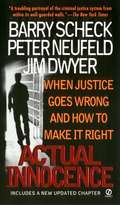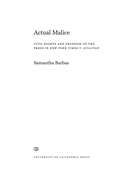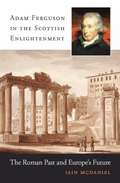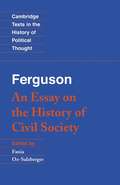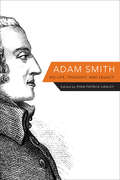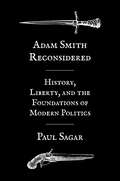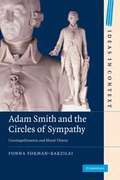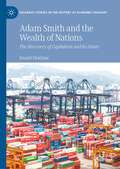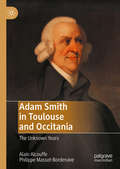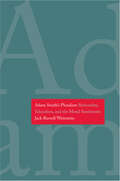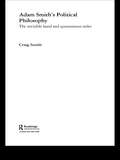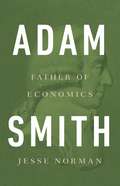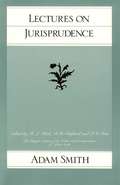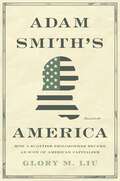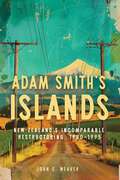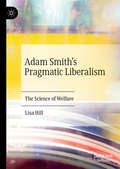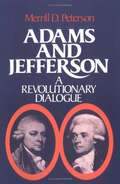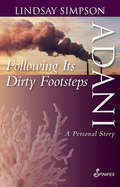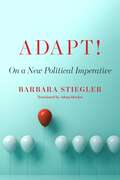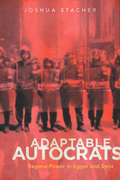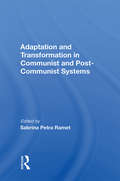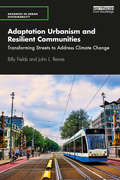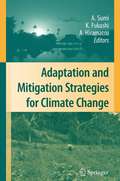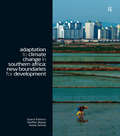- Table View
- List View
Actual Innocence: When Justice Goes Wrong and How to Make it Right
by Barry Scheck Peter Neufeld Jim DwyerThis book presents an account of lives ruined by miscarriages of justice and has also generated a storm of media attention, public outrage, and a nationwide debate on the criminal justice system.
Actual Malice: Civil Rights and Freedom of the Press in New York Times v. Sullivan
by Samantha BarbasA deeply researched legal drama that documents this landmark First Amendment ruling—one that is more critical and controversial than ever. Actual Malice tells the full story of New York Times v. Sullivan, the dramatic case that grew out of segregationists' attempts to quash reporting on the civil rights movement. In its landmark 1964 decision, the Supreme Court held that a public official must prove "actual malice" or reckless disregard of the truth to win a libel lawsuit, providing critical protections for free speech and freedom of the press. Drawing on previously unexplored sources, including the archives of the New York Times Company and civil rights leaders, Samantha Barbas tracks the saga behind one of the most important First Amendment rulings in history. She situates the case within the turbulent 1960s and the history of the press, alongside striking portraits of the lawyers, officials, judges, activists, editors, and journalists who brought and defended the case. As the Sullivan doctrine faces growing controversy, Actual Malice reminds us of the stakes of the case that shaped American reporting and public discourse as we know it.
Adam Ferguson in the Scottish Enlightenment
by Iain McdanielAlthough overshadowed by his contemporaries Adam Smith and David Hume, the Scottish philosopher Adam Ferguson strongly influenced eighteenth-century currents of political thought. A major reassessment of this neglected figure, Adam Ferguson in the Scottish Enlightenment: The Roman Past and Europe’s Future sheds new light on Ferguson as a serious critic, rather than an advocate, of the Enlightenment belief in liberal progress. Unlike the philosophes who looked upon Europe’s growing prosperity and saw confirmation of a utopian future, Ferguson saw something else: a reminder of Rome’s lesson that egalitarian democracy could become a self-undermining path to dictatorship. Ferguson viewed the intrinsic power struggle between civil and military authorities as the central dilemma of modern constitutional governments. He believed that the key to understanding the forces that propel nations toward tyranny lay in analysis of ancient Roman history. It was the alliance between popular and militaristic factions within the Roman republic, Ferguson believed, which ultimately precipitated its downfall. Democratic forces, intended as a means of liberation from tyranny, could all too easily become the engine of political oppression-a fear that proved prescient when the French Revolution spawned the expansionist wars of Napoleon. As Iain McDaniel makes clear, Ferguson’s skepticism about the ability of constitutional states to weather pervasive conditions of warfare and emergency has particular relevance for twenty-first-century geopolitics. This revelatory study will resonate with debates over the troubling tendency of powerful democracies to curtail civil liberties and pursue imperial ambitions.
Adam Ferguson: An Essay On The History Of Civil Society
by Fania Oz-Salzberger Adam FergusonAdam Ferguson's Essay on the History of Civil Society (first published in 1767) is a classic of the Scottish - and European - Enlightenment. Drawing on such diverse sources as classical authors and contemporary travel literature, Ferguson offers a complex model of historical advance which challenges both Hume's and Smith's embrace of modernity and the primitivism of Rousseau. Ferguson combines a subtle analysis of the emergence of modern commercial society with a critique of its abandonment of civic and communal virtues. Central to Ferguson's theory of citizenship are the themes of conflict, play, political participation and military valour. The Essay is a bold and novel attempt to reclaim the tradition of active, virtuous citizenship and apply it to the modern state.
Adam Smith
by Ryan Patrick HanleyAdam Smith (1723-90) is perhaps best known as one of the first champions of the free market and is widely regarded as the founding father of capitalism. From his ideas about the promise and pitfalls of globalization to his steadfast belief in the preservation of human dignity, his work is as relevant today as it was in the eighteenth century. Here, Ryan Hanley brings together some of the world's finest scholars from across a variety of disciplines to offer new perspectives on Smith's life, thought, and enduring legacy.Contributors provide succinct and accessible discussions of Smith's landmark works and the historical context in which he wrote them, the core concepts of Smith's social vision, and the lasting impact of Smith's ideas in both academia and the broader world. They reveal other sides of Smith beyond the familiar portrayal of him as the author of the invisible hand, emphasizing his deep interests in such fields as rhetoric, ethics, and jurisprudence. Smith emerges not just as a champion of free markets but also as a thinker whose unique perspective encompasses broader commitments to virtue, justice, equality, and freedom.An essential introduction to Adam Smith's life and work, this incisive and thought-provoking book features contributions from leading figures such as Nicholas Phillipson, Amartya Sen, and John C. Bogle. It demonstrates how Smith's timeless insights speak to contemporary concerns such as growth in the developing world and the future of free trade, and how his influence extends to fields ranging from literature and philosophy to religion and law.
Adam Smith Reconsidered: History, Liberty, and the Foundations of Modern Politics
by Paul SagarA radical reinterpretation of Adam Smith that challenges economists, moral philosophers, political theorists, and intellectual historians to rethink him—and why he mattersAdam Smith has long been recognized as the father of modern economics. More recently, scholars have emphasized his standing as a moral philosopher—one who was prepared to critique markets as well as to praise them. But Smith&’s contributions to political theory are still underappreciated and relatively neglected. In this bold, revisionary book, Paul Sagar argues that not only have the fundamentals of Smith&’s political thought been widely misunderstood, but that once we understand them correctly, our estimations of Smith as economist and as moral philosopher must radically change.Rather than seeing Smith either as the prophet of the free market, or as a moralist who thought the dangers of commerce lay primarily in the corrupting effects of trade, Sagar shows why Smith is more thoroughly a political thinker who made major contributions to the history of political thought. Smith, Sagar argues, saw war, not commerce, as the engine of political change and he was centrally concerned with the political, not moral, dimensions of—and threats to—commercial societies. In this light, the true contours and power of Smith&’s foundational contributions to western political thought emerge as never before.Offering major reinterpretations of Smith&’s political, moral, and economic ideas, Adam Smith Reconsidered seeks to revolutionize how he is understood. In doing so, it recovers Smith&’s original way of doing political theory, one rooted in the importance of history and the necessity of maintaining a realist sensibility, and from which we still have much to learn.
Adam Smith and the Circles of Sympathy: Cosmopolitanism and Moral Theory
by Fonna Forman-BarzilaiA broad-ranging study of Smith's views on moral judgement, humanitarian care, commerce, justice and international law.
Adam Smith and the Wealth of Nations: The Discovery of Capitalism and Its Limits (Palgrave Studies in the History of Economic Thought)
by Daniel DiatkineThis book examines the work of Adam Smith and his interest in the science of the legislator. Smith’s criticism of the mercantile system and the political dimension of capitalism is discussed, alongside insight into what institutions he saw as necessary to transform the mercantile system into a system of natural freedom. Through insights into Smith’s analysis of the political threats of capital accumulation and the growth of inequality, the point at which he discovered capitalism is highlighted. This book aims to explore Smith’s belief set out in The Wealth of Nations that the mercantile system was a viable, if dangerous, economic model. It is relevant to students and researchers interested in the history of economic thought.
Adam Smith in Toulouse and Occitania: The Unknown Years
by Alain Alcouffe Philippe Massot-BordenaveThis book provides substantial background on what Adam Smith did during his stay in Toulouse and the Languedoc region of France during the 18th century. This is a crucial period in Smith’s life for at least two reasons: i) it is during this time that Smith began to work on The Wealth of Nations; and ii) it is generally understood that although some of his ideas about political economy were already formed before his trip, his encounters with many French political economists during his time in France helped him to further develop them. As such, this book provides a rich resource to further understanding Smith's world, his travel experiences and the people he met during this time and situates these within the broader context of Smith's life as a whole, and within the British aristocracy.This work will be of value to students and researchers in the history of economic thought, travel studies and Scottish studies.
Adam Smith's Pluralism
by Jack Russell WeinsteinIn this thought-provoking study, Jack Russell Weinstein suggests the foundations of liberalism can be found in the writings of Adam Smith (1723#150;1790), a pioneer of modern economic theory and a major figure in the Scottish Enlightenment. While offering an interpretive methodology for approaching Smith's two major works, The Theory of Moral Sentiments and The Wealth of Nations, Weinstein argues against the libertarian interpretation of Smith, emphasizing his philosophies of education and rationality. Weinstein also demonstrates that Smith should be recognized for a prescient theory of pluralism that prefigures current theories of cultural diversity.
Adam Smith's Political Philosophy: The Invisible Hand and Spontaneous Order (Routledge Studies in Social and Political Thought #Vol. 42)
by Craig SmithWhen Adam Smith published his celebrated writings on economics and moral philosophy he famously referred to the operation of an 'invisible hand'. Adam Smith’s Political Philosophy makes visible this hand by examining its significance in Smith’s political philosophy and relating it to similar concepts used by other philosophers, thus revealing a distinctive approach to social theory that stresses the importance of the unintended consequences of human action. The first book to examine the history of Smith’s political philosophy from this perspective, this work introduces greater conceptual clarity to the discussion of the invisible hand and the related notion of unintended order in the work of Smith, as well as in political theory more generally. By examining the application of spontaneous order ideas in the work of Smith, Hume, Hayek and Popper, this important volume traces similarities in approach, and from these constructs a conceptual, composite model of an invisible hand argument. While setting out a clear framework of the idea of spontaneous order, the book also builds the case for using this as an explanatory social theory, with chapters on its application in the fields of science, moral philosophy, law and government.
Adam Smith: Father of Economics
by Jesse NormanA dazzlingly original account of the life and thought of Adam Smith, the greatest economist of all time Adam Smith (1723-1790) is now widely regarded as the greatest economist of all time. But what he really thought, and the implications of his ideas, remain fiercely contested. Was he an eloquent advocate of capitalism and individual freedom? A prime mover of "market fundamentalism"? An apologist for human selfishness? Or something else entirely? In Adam Smith, political philosopher Jesse Norman dispels the myths and caricatures, and provides a far more complex portrait of the man. Offering a highly engaging account of Smith's life and times, Norman explores his work as a whole and traces his influence over two centuries to the present day. Finally, he shows how a proper understanding of Smith can help us address the problems of modern capitalism. The Smith who emerges from this book is not only the greatest of all economists but a pioneering theorist of moral philosophy, culture, and society.
Adam Smith: Lectures on Jurisprudence
by Adam Smith D. D. Raphael R. L. Meek P. G. SteinSmith's Lectures on Jurisprudence, originally delivered at the University of Glasgow in 1762-1763, present his "theory of the rules by which civil government ought to be directed. " The chief purpose of government, according to Smith, is to preserve justice; and "the object of justice is security from injury. " The state must protect the individual's right to his person, property, reputation, and social relations. Building on his Theory of Moral Sentiments, Smith argues that the state must act as an impartial spectator, judging when an individual has been injured. The state must then design and apply civil and criminal laws to prevent further injuries and punish transgressors. Laws are also the means by which the state promotes public prosperity. Thus, regulations concerning trade, commerce, and production must be crafted so as to encourage rather than interfere with our productive capacities.
Adam Smith’s America: How a Scottish Philosopher Became an Icon of American Capitalism
by Glory M. LiuThe unlikely story of how Americans canonized Adam Smith as the patron saint of free marketsOriginally published in 1776, Adam Smith&’s The Wealth of Nations was lauded by America&’s founders as a landmark work of Enlightenment thinking about national wealth, statecraft, and moral virtue. Today, Smith is one of the most influential icons of economic thought in America. Glory Liu traces how generations of Americans have read, reinterpreted, and weaponized Smith&’s ideas, revealing how his popular image as a champion of American-style capitalism and free markets is a historical invention.Drawing on a trove of illuminating archival materials, Liu tells the story of how an unassuming Scottish philosopher captured the American imagination and played a leading role in shaping American economic and political ideas. She shows how Smith became known as the father of political economy in the nineteenth century and was firmly associated with free trade, and how, in the aftermath of the Great Depression, the Chicago School of Economics transformed him into the preeminent theorist of self-interest and the miracle of free markets. Liu explores how a new generation of political theorists and public intellectuals has sought to recover Smith&’s original intentions and restore his reputation as a moral philosopher.Charting the enduring fascination that this humble philosopher from Scotland has held for American readers over more than two centuries, Adam Smith&’s America shows how Smith continues to be a vehicle for articulating perennial moral and political anxieties about modern capitalism.
Adam Smith’s Islands: New Zealand’s Incomparable Restructuring, 1980–1995
by John C. WeaverMany developed countries restructured relations between state and economy from the late 1970s into the 1990s. Among them, New Zealand went far, fast, and left a clear trail, making it possible to study economic restructuring as it occurred, with all the debates, uncertainty, surprises, mistakes, and accomplishments this entailed. Adam Smith’s Islands reveals the inside life of a government determined to revolutionize its nation’s politics and economy.While the 1980s economic restructuring of members of the Organisation for Economic Co-operation and Development and former Warsaw Pact countries can seem like a foregone conclusion from the vantage point of the twenty-first century, John Weaver examines how local and global institutions had to come together to implement social adjustments in New Zealand. Mounting evidence that the state had not functioned as an effective manager split the business community and primary producers between defenders of subsidization and free-market insurgents. Reforms undertaken by the governing Labour Party included abandoning currency controls, privatizing state-run businesses, ending a multitude of open and disguised subsidies, tightening fiscal responsibility, and reforming taxation. Adam Smith’s Islands focuses on the verifiable: direct primary sources from dozens of state collections and deposits of personal papers. The archival cornucopia informing this history supports a narrative that has little in common with intellectual histories of neoliberalism. To understand how the relationship between the economy and the state changed, we need to grasp how and why core institutions, practices, and cultural beliefs shed some of their once potent legitimacy.Through the lens of New Zealand, Adam Smith’s Islands examines larger questions about policy dilemmas, the global flow of capital, and the sustainability of social adjustments in economic restructuring. In so doing, it casts new light on the formation and history of what is casually labelled today as the neoliberal state.
Adam Smith’s Pragmatic Liberalism: The Science of Welfare
by Lisa HillAdam Smith is commonly conceived as either an economist or a moral philosopher so his importance as a political thinker has been somewhat neglected and, at times, even denied. This book reveals the integrated, deeply political project that lies at the heart of Smith’s thought, showing both the breadth and novelty of Smith’s approach to political thought. A key argument running through the book is that attempts to locate Smith on the left-right spectrum (however that was interpreted in the eighteenth century) are mistaken: his position was ultimately dictated by his social scientific and economic thought rather than by ideology or principle. Through examining Smith’s political interests and positions, this book reveals that apparent tensions in Smith's thought are generally a function of his willingness to abandon, not only proto-liberal principles, but even the principles of his own social science when the achievement of good outcomes was at stake. Despite the common perception, negative liberty was not the be-all and end-all for Smith; rather, welfare was his main concern and he should therefore be understood as a thinker just as interested in what we would now call positive liberty. The book will uniquely show that Smith’s approach was basically coherent, not muddled, ad hoc, or ‘full of slips’; in other words, that it is a system unified by his social science and his practical desire to maximise welfare.
Adam and Evelyn
by John E. Woods Ingo SchulzeFrom one of Germany's finest writers comes a wonderfully light and humorous novel set during the tumultuous events of 1989. A wobbling Hungary has just opened its borders to Austria enabling a flood of refugees to escape, the Berlin Wall is on the cusp of falling, and, yet, seemingly sheltered from this onrushing new world in their idyllic East German home are Adam, a tailor and dressmaker who enjoys a life of dressing (and undressing) his appreciative clientele, and Evelyn, Adam's restless girlfriend. Having just unexpectedly quit her job as a waitress, Evelyn returns home one day to find Adam sleeping with one of his customers. Calmly, but quickly, Evelyn packs her belongings and runs off to Hungary on a vacation she had originally planned to take with Adam. Accompanying Evelyn on her journey is her friend Simone and Michael, Simone's West German cousin. In hot pursuit, however, to everyone's surprise or dismay, is Adam. Following the group in his family's rickety 1961 Communist-made automobile, Adam chases after Evelyn, banishing himself from his Garden of Eden as she pursues her very own idea of heaven. As Adam and Evelyn are swept out on a Western tide of new freedoms--helping refugees and helping themselves to impetuous trysts with others along the way--they find themselves forced to adjust to life in a world forever changed. Paradise regained? Perhaps not. Upending our expectations from the start, Adam and Evelyn is a deceptively simple love story that will enthrall longtime readers and those new to the delights of Ingo Schulze's stories alike.From the Hardcover edition.
Adams and Jefferson: A Revolutionary Dialogue
by Merrill D. PetersonA look at the relationship between Presidents John Adams and Thomas Jefferson.
Adani, Following Its Dirty Footsteps: A Personal Story
by Lindsay SimpsonAdani’s license to mine 60 million tonnes of coal for 60 years threatens Australia’s precious ancient source of groundwater in the Galillee Basin, a vast underground water reservoir, part of the Great Artesian Basin, occupying more than 20% of Australia. How could a company with a globally disastrous reputation for environmental destruction along with a dubious financial status woo an Australian Prime Minister, a State Premier and a handful of regional mayors to back a project to build Australia’s largest coalmine and the world’s largest coal terminal only kilometres from the Great Barrier Reef? This book documents the inconceivable story of how Australian governments abrogated their responsibilities to protect this world heritage icon; bypassing environmental safeguards, thereby irrevocably damaging Australia’s reputation as environmental steward of some of the world’s most valuable natural assets.
Adapt!: On a New Political Imperative
by Barbara StieglerWinner, French Voices AwardThis book, a crossover hit in France, offers a fresh genealogy of our neoliberal moment.“We must adapt!” These words can be heard almost everywhere and in every aspect of our lives. Where does this widespread sense that we have fallen behind come from? How can we explain this progressive colonization of the economic, social, and political fields by this biological vocabulary of evolution? Offering a lucid account of sophisticated material, Barbara Stiegler uncovers the prehistories of today’s ubiquitous rhetoric in Darwinism and American liberalism, while, at the same time, recovering powerful resistances to the rhetoric of adaptation across the twentieth century.Walter Lippmann, an American theorist of this new liberalism, believed democracy was not adapted to the needs of globalization. Only a government of experts could force society to evolve, he argued. Lippmann thus found himself confronted with John Dewey, the great figure of American Pragmatism. Both Lippmann and Dewey labored under the impression that the world had changed and society needed to adapt. However, Lippmann did not trust society to adapt on its own and insisted on the need for experts who would force the necessary adaptation. Dewey, by contrast, believed the necessary adaptation could only come "from below" and should proceed in a democratic fashion. Focusing on readings of Michel Foucault, Walter Lippmann, and John Dewey, Adapt! paves the way for renewed insights into neoliberalism’s history, essence, characteristic forces, and impacts, as well as biopolitical theory. Stiegler presents an intriguing new genealogy for the development of neoliberalism, examining whether humans are by nature lagging and require biopolitical and disciplinary management to enforce adaptation. Stiegler also reorients Foucault’s genealogy of neoliberalism by emphasizing the Darwinian rhetoric of adaptation, as it arose in the Lippmann–Dewey Debate, and deftly handles the question of human nature in a way that re-enlivens this traditional concept. As the industrialization of our ways of life never stops destroying the environment and the health of organisms (climate disruption, the destruction of biodiversity, the growth of chronic diseases, the return of large pandemics), how can we think of a democratic government of life and the living? This is the question that Stiegler’s work helps us to confront.
Adaptable Autocrats: Regime Power In Egypt And Syria
by Joshua StacherThe decades-long resilience of Middle Eastern regimes meant that few anticipated the 2011 Arab Spring. But from the seemingly rapid leadership turnovers in Tunisia and Egypt to the protracted stalemates in Yemen and Syria, there remains a common outcome: ongoing control of the ruling regimes. While some analysts and media outlets rush to look for democratic breakthroughs, autocratic continuity-not wide-ranging political change-remains the hallmark of the region's upheaval. Contrasting Egypt and Syria, Joshua Stacher examines how executive power is structured in each country to show how these preexisting power configurations shaped the uprisings and, in turn, the outcomes. Presidential power in Egypt was centralized. Even as Mubarak was forced to relinquish the presidency, military generals from the regime were charged with leading the transition. The course of the Syrian uprising reveals a key difference: the decentralized character of Syrian politics. Only time will tell if Asad will survive in office, but for now, the regime continues to unify around him. While debates about election timetables, new laws, and the constitution have come about in Egypt, bloody street confrontations continue to define Syrian politics-the differences in authoritarian rule could not be more stark. Political structures, elite alliances, state institutions, and governing practices are seldom swept away entirely-even following successful revolutions-so it is vital to examine the various contexts for regime survival. Elections, protests, and political struggles will continue to define the region in the upcoming years. Examining the lead-up to the Egyptian and Syrian uprisings helps us unlock the complexity behind the protests and transitions. Without this understanding, we lack a roadmap to make sense of the Middle East's most important political moment in decades.
Adaptation And Transformation In Communist And Post-communist Systems
by Sabrina Petra RametThis book tackles different aspects of the adaptive and transformative process in communist and post-communist systems in Eastern Europe, offering competing models, which locate the explanatory variable in different places and account for the unfolding of change in different ways.
Adaptation Urbanism and Resilient Communities: Transforming Streets to Address Climate Change (Advances in Urban Sustainability)
by John L. Renne Billy FieldsAdaptation Urbanism and Resilient Communities outlines and explains adaptation urbanism as a theoretical framework for understanding and evaluating resilience projects in cities and relates it to pressing contemporary policy issues related to urban climate change mitigation and adaptation. Through a series of detailed case studies, this book uncovers the promise and tensions of a new wave of resilient communities in Europe (Copenhagen, Rotterdam, and London), and the United States (New Orleans and South Florida). In addition, best practice projects in Amsterdam, Barcelona, Delft, Utrecht, and Vancouver are examined. The authors highlight how these communities are reinventing the role of streets and connecting public spaces in adapting to and mitigating climate change through green/blue infrastructure planning, maintaining and enhancing sustainable transportation options, and struggling to ensure equitable development for all residents. The case studies demonstrate that while there are some more universal aspects to encouraging adaptation urbanism, there are also important local characteristics that need to be both acknowledged and celebrated to help local communities thrive in the era of climate change. The book also provides key policy lessons and a roadmap for future research in adaptation urbanism. Advancing resilience policy discourse through multidisciplinary framework this work will be of great interest to students of urban planning, geography, transportation, landscape architecture, and environmental studies, as well as resilience practitioners around the world.
Adaptation and Mitigation Strategies for Climate Change
by Ai Hiramatsu Kensuke Fukushi Akimasa SumiIn recent decades there has been a growing awareness of how intricate the interactions are between human beings and the environment. Fortunately, progress has been made in understanding this relationship, and new technologies have been effective in addressing environmental problems. However belatedly, there has been an acknowledgment of the incompatibility of the world's finite resources with humankind's increasingly greater needs for them, and of how such a challenge demands broadened collaboration among engineers, social scientists, politicians and financial powers. Global agreement that the essential issues of the twenty-first century cannot be solved by any one discipline has led to the concept of sustainability. The transdisciplinary contributions selected for inclusion in this book address these concerns with an overview of the diverse fields of study related to sustainability. This collection of work is intended to pave the way for further collaboration among scientists and nations as well.
Adaptation to Climate Change in Southern Africa: New Boundaries for Development (Climate and Development Series)
by Steffen Bauer Imme ScholzAdverse climate impacts are already evident across Southern Africa and pose a serious threat to the development prospects of the region's societies. Sustainable development in this region will depend on the rapid development and implementation of effective adaptation measures. This volume identifies the new socioeconomic and political boundaries to development that result from ongoing climate change in Southern Africa. The collected papers explore the region's potential for a transition to development strategies that combine meaningful socioeconomic investment and adaptation measures while also improving livelihoods in the region. The chapters are backed up by detailed case studies which underscore the urgent need for national governments and multilateral agencies to develop strategies to support Southern Africa's societies in adapting to climate change.
